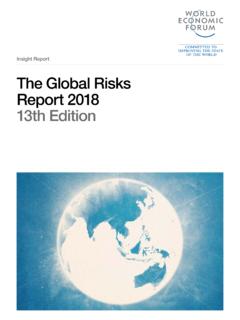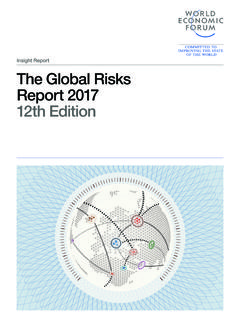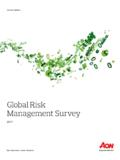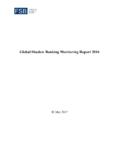Transcription of The Global Health 50/50 Report 2018
1 The Global Health 50/50 Report 2018 The Global Health 50/50 ReportHow gender-responsive are the world s most influential Global Health organisations?First report2018 The Global Health 50/50 initiative is housed by the University College London Centre for Gender and Global initiative is guided by a diverse independent Advisory Council (Annex 1). Global Health 50/50 is leda by Professor Sarah Hawkes1 and Dr Kent Buse2 with a dedicated team of researchers, strategists and communications experts working on a largely voluntary basis: Claudia Ahumada3, Charlotte Brown4, Chloe Byers5, Tiantian Chen6, Mikaela Hilderbrand7, Ruth Lawlor8, Edward Mishaud9, Elias Nosrati10, Anna Purdie11 and Sonja Tanaka12. This Report was supported by a grant from Wellcome Trust, Grant reference number: 210398/Z/18/Z, Global Health 50/50 : Towards accountability for gender equality in Global Health .
2 A1 University College London; 2 UNAIDS; 3 UNAIDS; 4 London School of Economics; 5 Independent Volunteer; 6 Cambridge University; 7 Swedish International Development Cooperation Agency; 8 Cambridge University; 9 Independent Consultant; 10 Cambridge University; 11 University College London; 12 Independent Consultant. @GlobalHlth5050 #GH5050 1 ForewordP. 2 About the reportP. 5 Are Global Health organisations advancing gender equality?P. 8 Still gender blind after all this time: summary of findings and recommendationsP. 1 7 Why gender mattersP. 2 2 The findings in depth: examining the gender policies of 140 organisations involved in Global healthP. 3 2 Fast-forwarding the pace of change: how can we make Global Health more gender-responsive?P. 3 4 Annex 1: Global Health 50/50 Advisory CouncilP.
3 3 5 Annex 2: Research methodsP. 3 6 Annex 3: Full findings of Global Health 50/50 analysis of 140 Global Health organisationsContentsGender equality in Health means that women and men, across the life-course and in all their diversity, have the same conditions and opportunities to realize their full rights and potential to be healthy, contribute to Health development and benefit from the results. WHO Gender fact sheet Accessible at: From the United Nations Deputy Secretary-General: ForewordGender equality is fundamental to the 2030 Agenda for Sustainable Development. But to focus our efforts in the right arenas, track progress over time and hold each other accountable, we need transparent data and analysis. That is why this Report is an important milestone. Thanks to the efforts of Global Health 50/50 , the gender dimensions of Global Health are increasingly Report shows that, although gender is one of the most significant social determinants of Health outcomes, the Global Health community remains largely gender-blind.
4 This holds true both in ensuring gender parity in leadership across public, private and civil society organisations and in delivering gender-responsive programmes. The Report , however, gives reason for hope. First, some organisations have shown that, with leadership and determination, it is possible to advance gender equality. I am particularly pleased to see United Nations (UN) organisations performing well and committing to a holistic vision of gender equality. But there is always room for improvement. Strengthening delivery for all requires dedicated gender expertise, scaled-up resources and a greater understanding of gender by all staff. The Secretary-General is committed to advancing this priority to transform our institutional culture so we can deliver on the 2030 Agenda for , the Report shows that the Millennium Development Goals (MDGs) made huge inroads in improving child and maternal Health and curbing the burden of infectious diseases.
5 It is now time to increase focus on the neglected targets of Sustainable Development Goal (SDG) 3 on Health and wellbeing, and to address them from a nuanced gender perspective. In that regard, the European Union and United Nations Spotlight Initiative to eliminate violence against women and girls has women s access to Health services, including sexual and reproductive Health , as one of its core pillars. Third, the Report argues we need to take issues such as early forced marriage, adolescent unintended pregnancies and gender-based violence more seriously. The United Nations is committed to leading through the work of its various funds and programmes. The organisation has also committed to improve its effectiveness in preventing sexual exploitation and abuse and to put the rights and dignity of victims at the centre of its approach of Global Health 50/50 is in line with the 2030 Agenda in making explicit the interdependence of the SDGs and as a joint initiative of researchers and policy-makers from all sectors and regions in showing the power of partnership.
6 I urge the Global Health community to reflect on the findings presented and to act to improve practice. I hope, too, that other sectors will follow suit and undertake similar analysis. It is only by embedding gender analysis and action deep in the Global structures of development cooperation that we will achieve sustainable and inclusive development that leaves no one behind. Amina J. Mohammed, New York, February 20181 Global Health 50/50 seeks to advance action and accountability for gender equality in Global Health . The Global Health 50/50 Report , the first of its kind, provides a comprehensive review of the gender-related policies of 140 major organisations working in and/or influencing the field of Global Health . The initiative is focused at the intersection of several SDGs, including Health (3), gender equality (5), inequalities (10) and inclusive societies and institutions (16).
7 Gender equality has seemingly been embraced as a priority in Global Health . However, the Report is inspired by a growing concern that too few Global Health organisations walk the talk by defining, programming, resourcing or monitoring gender, either as a determinant of Health , or as a driver of career equality in their own workplaces. The Report seeks to provide evidence of where the gaps lie, while also shining a light on ways forward. Through an examination of seven domains (see Figure 1), the Report provides an in-depth look at the extent to which Global Health organisations commit and take action to promote gender equality, both through their programmes and operations, and within the workplace. The Report is based on reviewing a snapshot of publicly available information between October 2017 and February 2018.
8 We are grateful to the approximately 50 organisations that responded to our request to verify the accuracy of the data we collected (listed in footnote 1). Full details of the methodology are given in Annex 2. The list of organisations and their results across the seven domains is included in Annex 3. In response to its findings, the Report presents a series of evidence-informed policy recommendations that Global Health organisations can take to be at the forefront of meaningfully driving gender equality in and through Health . This Report arrives at a significant moment. At the time of publication, a number of organisations included in this review were under investigation for sexual misconduct by senior staff, including several organisations that performed relatively well on the domains analysed by GH5050.
9 This discrepancy highlights the urgent need for organisations to live up to and put into practice their own policies on equality, non-discrimination and inclusion. Having the right policies in place is essential, but insufficient for ensuring a safe, respectful and equitable working environment and organisational culture. Allegations of sexual misconduct and entrenched cultures of sexism against the very organisations meant to serve and protect the rights of the most vulnerable among us lay bare the long road ahead to gender equality in the workplace. Independent accountability mechanisms such as GH5050 will play an important role; most critical will be a demonstrated commitment by the leadership of these organisations to transform the structures, norms and values that perpetuate inequality, including through the establishment of rigorous internal accountability We are grateful to the listed organisations that responded to our requests for information and verification of data: Abt Associates; ACTION; AVERT; CARE; Caterpillar Foundation; Centers for Disease Control and Prevention; Clinton Health Access Initiative; Deloitte; FHI360; FIND Diagnostics; GAVI; Global Fund to Fight AIDS, TB and Malaria; Global Health Council; Global Health Innovative Technology Fund; Global Public-Private Partnership for Handwashing.
10 International AIDS Society; International Centre for Research on Women; International Federation of Red Cross and Red Crescent Societies; International Vaccine Institute; International Women s Health Coalition; Japan International Cooperation Agency; Jhpiego; Johnson Medicines for Malaria Venture; M decins Sans Fronti res; Medtronic; Merck; Mylan; NCD Alliance; Nutrition International; Oxfam International; PAI; Partnership for Maternal, Newborn and Child Health ; Pfizer; Population Services International; PricewaterhouseCoopers; Reckitt Benckiser; Roll Back Malaria Partnership; Scaling Up Nutrition; Swedish International Development Cooperation Agency; Stop TB; UNAIDS; UN Population Fund (UNFPA); UN Women; UNICEF; Unilever; United States Agency for International Development; Wellcome Trust; World Health programmes and policiesHow gender-responsive are the world s most influential Global Health organisations?




